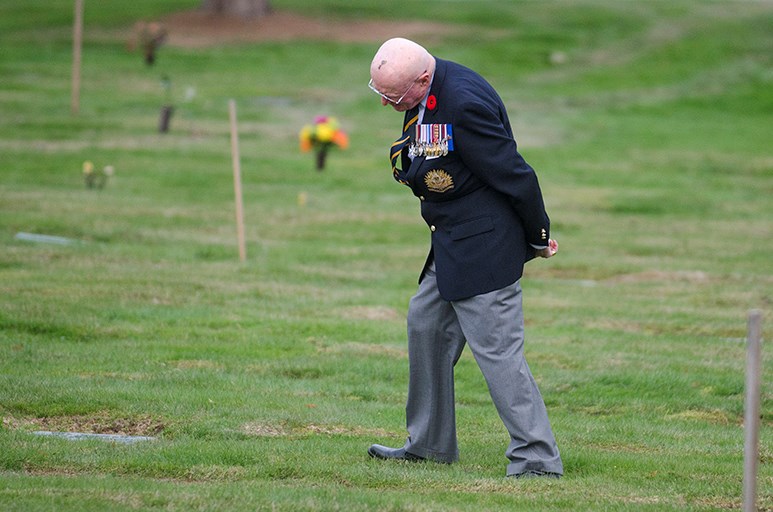Retired colonel Leslie Deane will visit Burnaby’s Forest Lawn Cemetery on Remembrance Day as he does every year.
Among the ground-level markers in a section set aside for Canadian veterans is one indicating the final resting place of Staff Sgt. Noel Deane, a veteran of two world wars and Deane’s father.
Providing his dad with a proper funeral, complete with a marker recognizing his military service, was not a problem for Deane, a Burnaby school principal for more than 30 years.
“I looked after him, no worries there,” he said.
But not all Canadian veterans have been so fortunate.
Some have died destitute, without family resources for a proper funeral.
Since 1910, the Last Post Fund – an organization Deane volunteered with for years – has worked make sure no Canadian or Allied veteran is denied a dignified funeral and burial because of poverty.
Since 1996, the organization has also worked to provide permanent military-style markers to eligible Canadian and Allied veterans lying in unmarked graves.
In Vancouver’s Mountain View Cemetery alone, manager Glen Hodges estimates a “few thousand” destitute Canadian and Allied veterans have been buried with help from the Last Post Fund over the last century.
But not all of their graves are properly marked.
Deane, as a past president of the B.C. and Yukon branch of the Last Post Fund, was part of an ongoing effort to change that.
Working with the cemetery and Veterans Affairs Canada, the Last Post Fund has helped get proper markings onto about 100 Mountain View graves over the last 12 years – but more than 800 unmarked graves remain.
The challenge is often one of verification, according to Hodges.
“To get qualified to bury in there was the easy part,” he said of the cemetery’s military areas. “To mark the grave required a bit more formality.”
The Last Post Fund now has a researcher working to match the names of people in Mountain View’s burial records with military service records, not just from Canada but from other Allied countries as well – a task made even more complicated if the veteran in question lied about his age in order to serve.
“The requirement in order to spend Last Post Fund money or Veterans Affairs money, they want to make sure that it’s going on a legitimate veteran’s grave,” Hodges said.
Besides working to make sure unmarked veterans’ graves are properly marked, the Last Post Fund also promotes other initiatives designed to honour the memory of Canadian and Allied Veterans.
In 2016, the organization partnered with the City of Surrey to erect a memorial to honour the 500 veterans buried in the Surrey Central Cemetery.
“It’s a beautiful piece of art. It’s gorgeous,” manager Anna Christian said.
Another similar memorial will soon be erected at Mountain View Cemetery.
After that, the next project in the sights of the B.C. and Yukon branch of the Last Post Fund is Burnaby’s Forest Lawn Cemetery.
“The main objective of approaching Forest Lawn would be to solicit a small piece of land where the Last Post Fund would place a memorial similar to the one which will be placed at Mountain View Cemetery in Vancouver,” current B.C. and Yukon president and Burnaby resident, retired major Gino Simeoni told the NOW. “Naturally we will be looking at placing new markers or replacing markers which have deteriorated because of time.”
Forest Lawn manager Jarma Del Rosario said she doesn’t know whether there are any unmarked veterans’ graves at Forest Lawn, but she’d be willing to work with the Last Post Fund to find out.
“Absolutely, we’d be 100 per cent on board with helping them out in whatever way we can,” she said. “If there are unmarked veterans’ graves, obviously that would be great to have those as marked graves.”
For Deane, who served as a reservist in the Canadian Forces for 37 years, making sure Canadian and Allied veterans are recognized is important.
“I guess it started with my father having served in the two wars,” he said.
How it all started
In December 1908, two policemen found a homeless man huddled in a downtown Montreal doorway. Unconscious, the man was taken to a nearby hospital where he was diagnosed as a drunk and taken to a room to sleep it off.
Arthur Hair, the head orderly, noticed a blue envelope sticking out of the man’s pocket. A veteran of the South African War, Hair recognized the type of envelope. It had been issued by the British War Office and contained the honourable discharge of the homeless man, Trooper James Daly, after 20 years of service.
Daly, had not been drunk; he had been suffering from hypothermia and malnutrition. Never regaining consciousness, he died two days later at the age of 53.
His unclaimed body was set to be turned over to science for medical research, but Hair intervened.
He was shocked by the Empire’s disregard for its veteran and raised money from friends and colleagues to give him a decent and dignified funeral.
Daly’s story was the catalyst of the founding of the Last Post Fund in Montreal in April 1909.
Since then, the organization has helped 150,000 service men and women like Trooper Daly.



